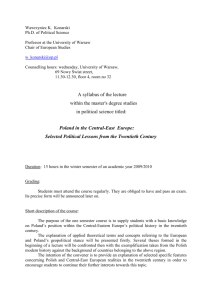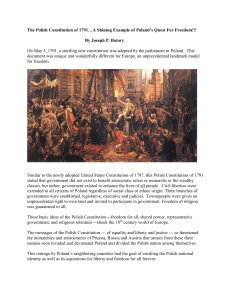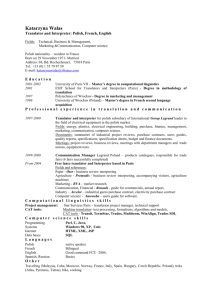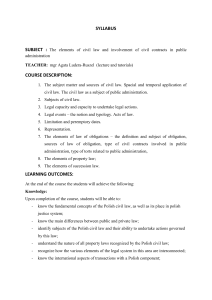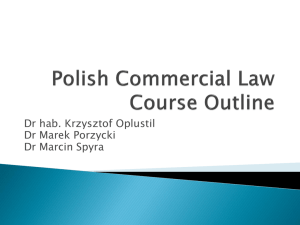Tutorial
advertisement
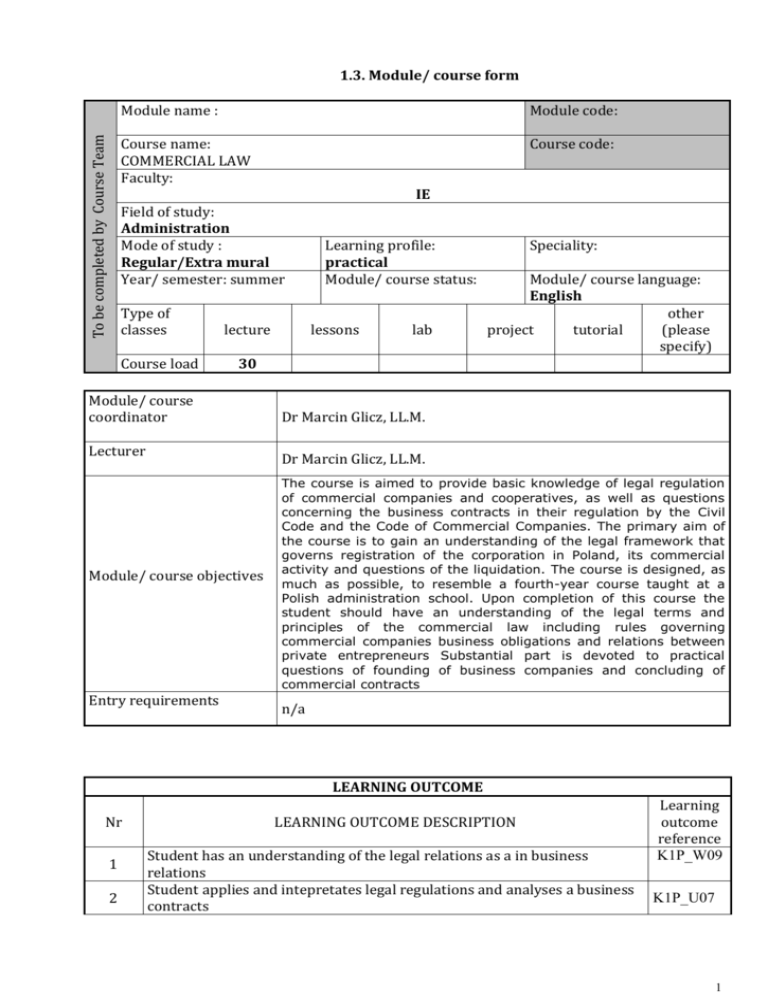
To be completed by Course Team 1.3. Module/ course form Module name : Module code: Course name: COMMERCIAL LAW Faculty: Course code: IE Field of study: Administration Mode of study : Regular/Extra mural Year/ semester: summer Type of classes Course load lecture Learning profile: practical Module/ course status: lessons lab Speciality: Module/ course language: English other project tutorial (please specify) 30 Module/ course coordinator Lecturer Dr Marcin Glicz, LL.M. Dr Marcin Glicz, LL.M. Module/ course objectives Entry requirements The course is aimed to provide basic knowledge of legal regulation of commercial companies and cooperatives, as well as questions concerning the business contracts in their regulation by the Civil Code and the Code of Commercial Companies. The primary aim of the course is to gain an understanding of the legal framework that governs registration of the corporation in Poland, its commercial activity and questions of the liquidation. The course is designed, as much as possible, to resemble a fourth-year course taught at a Polish administration school. Upon completion of this course the student should have an understanding of the legal terms and principles of the commercial law including rules governing commercial companies business obligations and relations between private entrepreneurs Substantial part is devoted to practical questions of founding of business companies and concluding of commercial contracts n/a LEARNING OUTCOME Nr 1 2 LEARNING OUTCOME DESCRIPTION Student has an understanding of the legal relations as a in business relations Student applies and intepretates legal regulations and analyses a business contracts Learning outcome reference K1P_W09 K1P_U07 1 3 Student is able to verify the actions, attitudes in the legal context and K1P_K11 searching appropriate solutions ; remains critical by expressing opinions relating to legal questions CURRICULUM CONTENTS Lecture 1. Introduction and overview; definition of the commercial law; sources of commercial law in Poland; legislation, custom, judicial decisions, works of legal scholars 2. Nature and legal framework of business conduction in Poland; business name, procuration; legal status of the participants of the commercial activity. Commercial organization – the major type of enterprises. General provisions of the foundation of the corporation. 3. Registration of the corporation 4. Partnership and company. Legal status of the partnerships and companies in Poland. 5. Registered partnership. Internal relationships and relationships with third parties. Liability of the partners. Dissolution of partnership. 6. Professional partnership. Limited partnership. Limited Joint-Stock Partnership. 7. Companies. Company in organization. Limited liability company. Joint-stock company. 8. Organization of a limited liability company. Capital of the company. Shares. Rights and duties of shareholders. Company bodies, the management, supervision board, meeting of shareholders. 9. Organization of a joint-stock company. Capital of the company. Shares. Rights and duties of shareholders. Company bodies, the management, supervision board, general of shareholders. Transnational forms of business activities. European company. European Economic Interest Grouping. 10. Procedures on bankruptcy and liquidation of partnership and company 11. Law on commercial contracts. Foundation, modification and termination of commercial contracts. 12. Contract of commercial sales. Nature, forms and requisites. International sale of goods. 13. Contract of leasing. Nature, forms and requisites. 14. Contract of agency. The essence of Agency. Agent-Principal Relationship. Principal-Third Party Relationship. Agent-Third Party Relationship. Agency related contracts in business. 15. Insolvency and bankruptcy forms. Tutorial Basic literature Additional literature Teaching methods Lewandowski, R., Polish commercial law. An introduction, Warszawa 2007 1. Brodecki, Z., Polish business law, Kluwer 2003. 2. Kierzkowska, D., Business Law. The Polish Law Collection, Warszawa 2007. Lectures and seminars. Study of selected readings. Each lecture will combine theoretical information and practical examples. Assessment method Examination Learning outcome number 01-03 2 Form and terms of an exam Written exam STUDENT WORKLOAD Participation in lectures Independent study of lecture topics Participation in tutorials, labs, projects and seminars Independent preparation for tutorials* Preparation of projects/essays/etc. * Preparation/ independent study for exams Participation during consultation hours Other TOTAL student workload in hours Number of ECTS credit per course unit Number of hours 30 15 15 0,1 60,1 Number of ECTS credit associated with practical classes Number of ECTS for classes that require direct participation of professors 3



